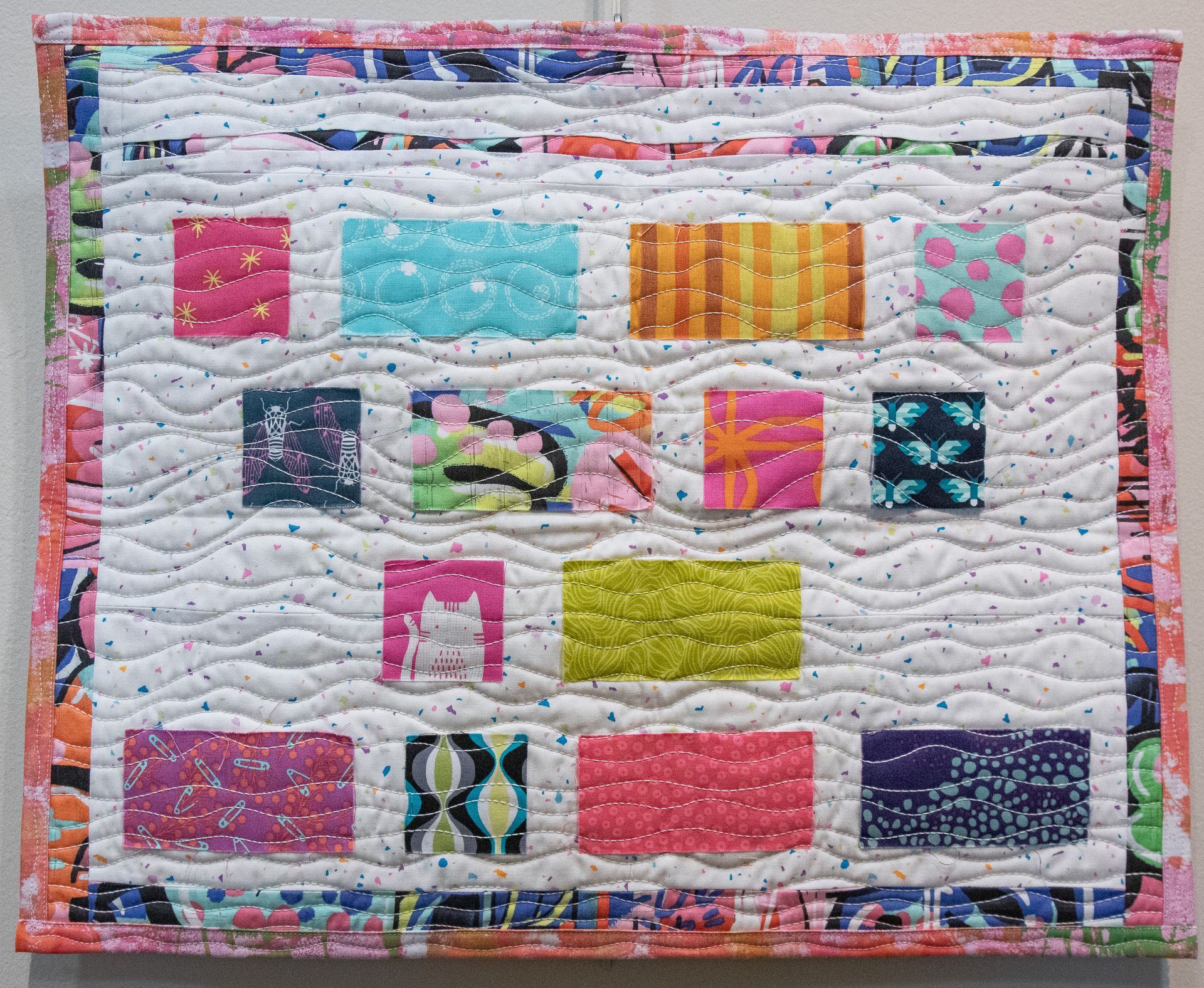Play

19x21.5in quilter’s cotton (machine-pieced and quilted), created in 2023, NFS
This quilt is meant to give a nod to all the different types of parents that are chasing children. Thank you for helping our future generations grow, learn, and create change! Dr. Daniel Siegel is a phenomenal researcher on child development, and he has a plethora of books on the topic. I encourage you to check out his website, online videos, and books to support your parenting practice.
What to look for: This improv’ed pieced quilt and the squares are an artistic form of morse code, each horizontal line is a letter, and it spells out PLAY. Children learn through play, and children remind us how to play as well.
Learn more: https://drdansiegel.com/the-power-of-showing-up-handouts/
Book recommendation(s): These books are not meant to replace medical intervention and/or skilled therapy.
https://drdansiegel.com/books/ & a themed list of story books for children https://maistorybook.com/category/themedbookcollections/
The Whole-Brain Child: 12 Revolutionary Strategies to Nurture Your Child's Developing Mind https://a.co/d/inVXsv5
No-Drama Discipline: The Whole-Brain Way to Calm the Chaos and Nurture Your Child's Developing Mind https://a.co/d/7OFI3J3
How to Talk So Kids Will Listen & Listen So Kids Will Talk https://a.co/d/iHZ0FHo
Permission to Feel: Unlocking the Power of Emotions to Help Our Kids... https://a.co/d/9jigt0V
If you are having concerns about your child's behavior and you are unsure what may be going on, please read on. The list of symptoms could be helpful to take note of for your medical provider.
Please start HERE: Children and Mental Health: Is This Just a Stage? (NIMH)
From NIMH - Symptoms to potentially be concerned about:
Young children may benefit from an evaluation and treatment if they:
- Have frequent tantrums or are intensely irritable much of the time
- Often talk about fears or worries
- Complain about frequent stomachaches or headaches with no known medical cause
- Are in constant motion and cannot sit quietly (except when they are watching videos or playing video games)
- Sleep too much or too little, have frequent nightmares, or seem sleepy during the day
- Are not interested in playing with other children or have difficulty making friends
- Struggle academically or have experienced a recent decline in grades
- Repeat actions or check things many times out of fear that something bad may happen
Older children and adolescents may benefit from an evaluation and treatment if they:
- Have lost interest in things that they used to enjoy
- Have low energy
- Sleep too much or too little or seem sleepy throughout the day
- Are spending more and more time alone and avoid social activities with friends or family
- Diet or exercise excessively, or fear gaining weight
- Engage in self-harm behaviors (such as cutting or burning their skin)
- Smoke, drink, or use drugs
- Engage in risky or destructive behavior alone or with friends
- Have thoughts of suicide
- Have periods of highly elevated energy and activity and require much less sleep than usual
- Say that they think someone is trying to control their mind or that they hear things that other people cannot hear
Some of the diagnoses you may encounter (aside from adjustment, anxiety, grief, depression, ptsd):
Reactive Attachment Disorder (rare & severe): A rare but serious condition in which an infant or young child doesn't establish healthy attachments with parents or caregivers. Reactive attachment disorder usually starts in infancy. There's little research on signs and symptoms of reactive attachment disorder beyond early childhood, and it remains uncertain whether it occurs in children older than 5 years. Some of the signs may include: unexplained withdrawal, fear, sadness or irritability, sad and listless appearance, not seeking comfort or showing no response when comfort is given, failure to smile, CLICK HERE TO READ MORE and HERE.
Autism Spectrum Disorder:
Autism spectrum disorder begins in early childhood and is a condition related to brain development that impacts how a person perceives and socializes with others, causing problems in social interaction and communication. The disorder also includes limited and repetitive patterns of behavior. The term "spectrum" in autism spectrum disorder refers to the wide range of symptoms and severity.
CLICK HERE TO READ MORE.
Disruptive Mood Dysregulation Disorder:
A condition in which children or adolescents experience persistent irritability and anger and frequent, intense temper outbursts.
Many children go through periods of moodiness, but children with DMDD experience severe symptoms and often have significant problems at home and school. They may also struggle to interact with peers. Youth with DMDD are typically diagnosed between the ages of 6 and 10. To be diagnosed with DMDD, a child must have experienced symptoms steadily for 12 or more months.
CLICK HERE TO READ MORE.
Attention-Deficit Hyperactivity Disorder: Attention-deficit/hyperactivity disorder (ADHD) is marked by an ongoing pattern of inattention and/or hyperactivity-impulsivity that interferes with functioning or development. People with ADHD experience an ongoing pattern of the following types of symptoms: Inattention, Hyperactivity, Impulsivity. CLICK HERE TO READ MORE.
If your child is experiencing any of the above symptoms, please see out a psychiatric or psychological evaluation to get the help you need! Start by contacting your insurance provider to obtain referral sources for psychological evaluations that are in your network. You can also search www.PsychologyToday.com to search for providers.
Resources:
Click here for a 16min video on how childhood trauma effects health across a lifetime.
Click here to learn more about MAYO Clinic's Guide to Raising a Healthy Child.
